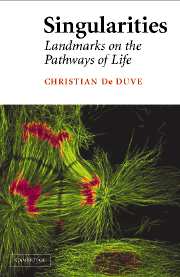Book contents
- Frontmatter
- Contents
- Foreword
- On Christian de Duve: An Editor's Appreciation
- General Introduction
- 1 Building Blocks
- 2 Homochirality
- 3 Protometabolism
- 4 ATP
- 5 Electrons and Protons
- 6 Thioesters
- 7 RNA
- 8 Proteins
- 9 DNA
- 10 Membranes
- 11 Protonmotive Force
- 12 Protometabolism Revisited
- 13 The LUCA
- 14 The First Fork
- 15 Eukaryotes
- 16 Oxygen
- 17 Endosymbionts
- 18 Multicellulars
- 19 Homo
- 20 Evolution
- Final Comments
- Bibliography
- Index
20 - Evolution
Published online by Cambridge University Press: 18 January 2010
- Frontmatter
- Contents
- Foreword
- On Christian de Duve: An Editor's Appreciation
- General Introduction
- 1 Building Blocks
- 2 Homochirality
- 3 Protometabolism
- 4 ATP
- 5 Electrons and Protons
- 6 Thioesters
- 7 RNA
- 8 Proteins
- 9 DNA
- 10 Membranes
- 11 Protonmotive Force
- 12 Protometabolism Revisited
- 13 The LUCA
- 14 The First Fork
- 15 Eukaryotes
- 16 Oxygen
- 17 Endosymbionts
- 18 Multicellulars
- 19 Homo
- 20 Evolution
- Final Comments
- Bibliography
- Index
Summary
Except for the creationist fringe – regrettably more than a fringe in certain parts of the world – that gives more credence to words written some three thousand years ago than to fossilized vestiges of ancient life, isotope-decay measurements, or molecular sequences, the fact of biological evolution is accepted by all those acquainted with the evidence and by the many educated people who, without being specialists themselves, value the scientific approach and are ready to trust its conclusions, especially when these are unanimously endorsed by those who are competent to appreciate the underlying evidence.
The mechanisms of evolution, on the other hand, still form the object of debates among experts, but these debates deal more with details and, even, semantics than with the general process of evolution. The main principles, first enunciated by Darwin, of continuity by heredity, variation by genetic modifications, competition among variants for available resources, and screening by natural selection according to the organisms' ability to survive and reproduce under prevailing environmental conditions, are broadly subscribed to. Furthermore, the essentially accidental nature of the genetic modifications responsible for the variety and their lack of intentionality or foresight are seen as conclusively established by modern molecular biology. Only a small minority of scientists dispute the validity of the neo-Darwinian theory, accepting it only for horizontal evolution, but not for vertical evolution, which they claim, against the opinion of most biologists, has, in certain key events, been guided by some finalistic principle of unknown nature, the agent of intelligent design.
- Type
- Chapter
- Information
- SingularitiesLandmarks on the Pathways of Life, pp. 231 - 237Publisher: Cambridge University PressPrint publication year: 2005

